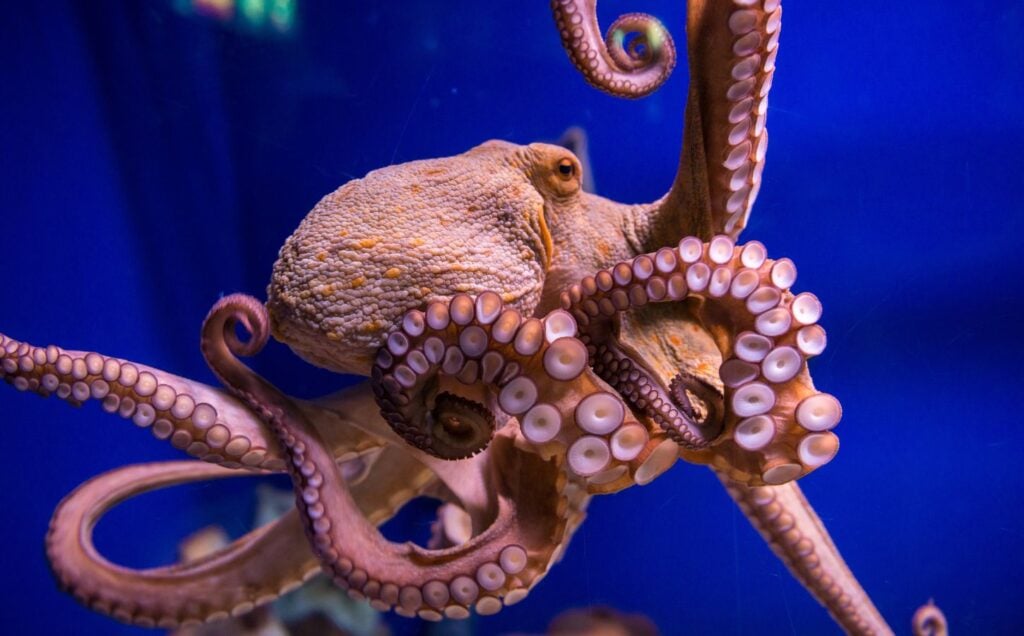For almost two years now, reports have been circulating that a world first intensive commercial octopus farm is set to be established in the Canary Islands, Spain.
The plans come from a Spanish multinational fishing company called Nueva Pescanova. If they go ahead, it’s thought that around one million octopuses will be farmed and killed each year in the facility.
In a world where some 92 billion land animals, as well around 100 billion fish, are farmed for food each year, why is it that the octopus farm is attracting such extensive press attention? One answer is that the plans are unprecedented – these animals have never been farmed in this way before, and octopuses consumed by humans have thus far been a product of the fishing industry. Since the plans were unveiled, a number of scientists have come forward to condemn them. The overriding feeling among experts is that octopuses will suffer hugely on farms, and that plans to keep them captive will be of huge detriment to their welfare.
The experts are right, but many would argue that it’s equally as cruel to farm all animals, regardless of species, and that it’s a shame that other animal farms aren’t receiving the same level of backlash. The plans do, however, indicate we are becoming deeper entrenched in animal agriculture, when we should be heading in the other direction. The construction of a farm to house yet another species is seen by many as a huge step backwards in the fight for the rights of all animals.
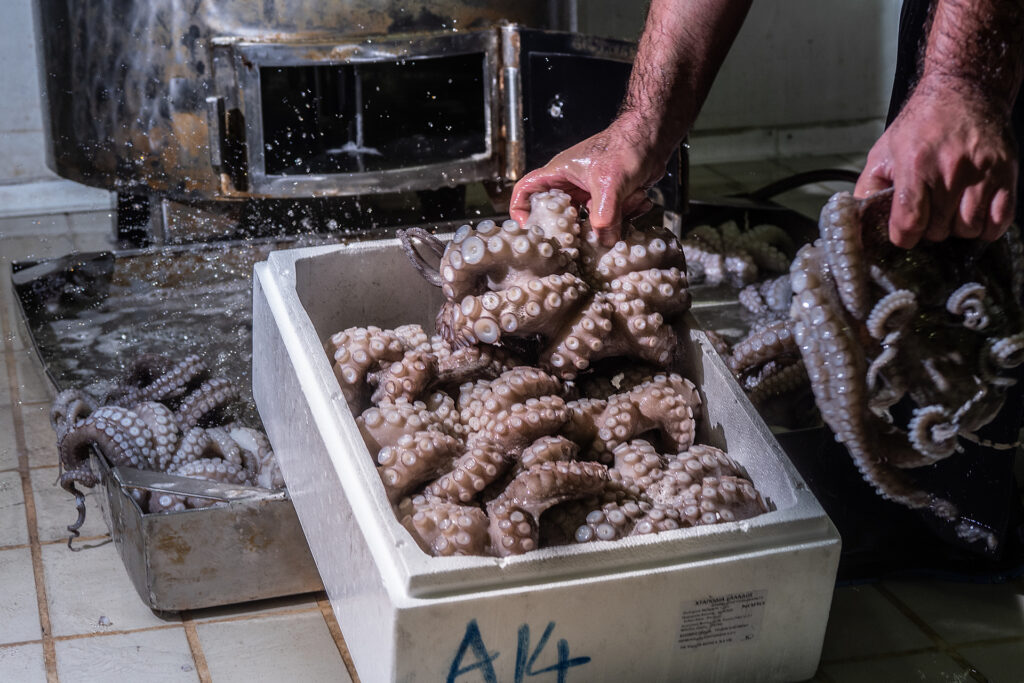
What is the world’s first octopus farm? When will it be built?
The proposal for the world’s first commercial octopus farm was unveiled in 2021. Blueprints leaked to the BBC revealed that Nueva Pescanova planned to house the farm in a two-story building. Reports at the time stated that 3,000 tonnes of octopus meat would be produced, amounting to around one million animals.
The company is planning to build the facility at the port of Las Palmas in Gran Canaria. The location was chosen because of the temperature of the surrounding waters, as the farm will utilize nearby seawater. We don’t currently know when the farm will open, but Nueva Pescanova hopes its application will be approved by the end of 2023. If and when it is approved, the farm will begin the construction phase, which will likely take around two years. According to reports, it will cost around €65 million (approximately £55 million, or USD 71 million).
The company is already breeding and raising octopuses in tanks at a research facility in northern Spain in preparation for the farm. These animals will be transported to Las Palmas when it’s built. Once they arrive, it’s thought that it will take around a year and a half to reach slaughter age. This means that the first octopuses from the farm will hit the market in 2027 at the earliest.
How will octopuses be kept on the farm?
Octopuses will be housed in tanks with around 1,000 other animals. In the natural world, octopuses spend most of their lives alone, hunting and swimming around the ocean. Due to the conditions in which they’re kept, the Nueva Pescanova documents predicted a mortality rate of 10-15 percent.
Dr Elena Lara, Fish Research Manager at Compassion In World Farming, has authored two recent reports on octopus farming. She tells Plant Based News (PBN) that the animals will experience “intense suffering” on the farm.
“Octopuses are complex and intelligent animals; the typical barren and sterile conditions of factory farms do not allow these animals to express their natural behaviors,” she says. “Moreover, they are solitary, and the overcrowded conditions will stress these animals. Octopuses are simply not suitable for intensive, mass production conditions. They belong in the wild.”
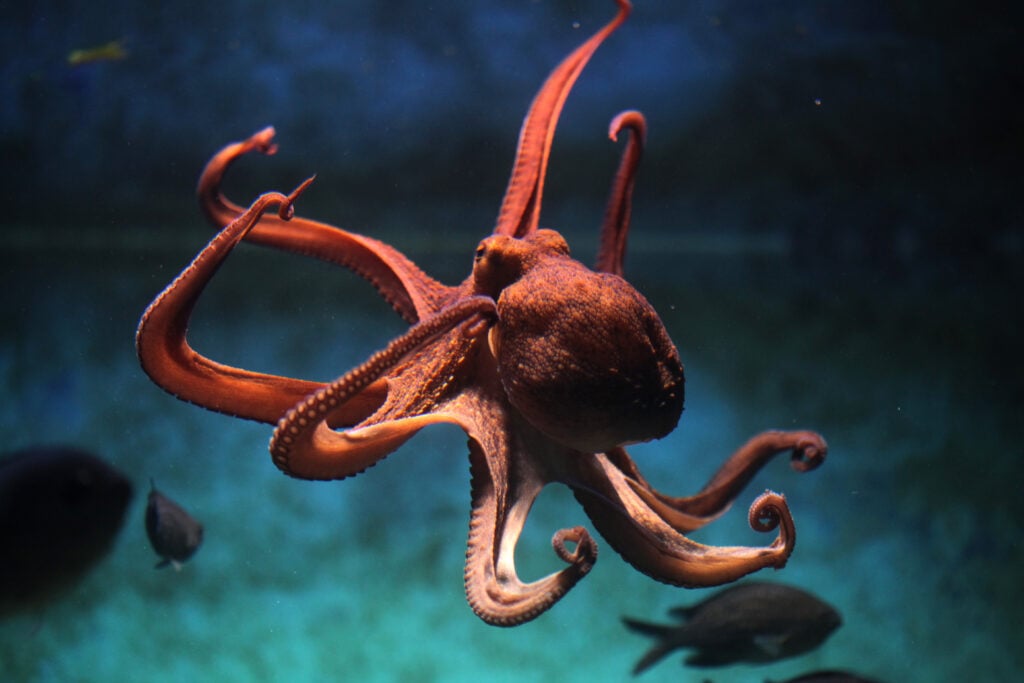
Octopuses are carnivorous animals, and they need to be fed on fish. Like the wider aquaculture industry, therefore, the octopus farm could contribute to the environmentally damaging fishing industry.
“Octopuses need animal protein and commercial feeds include fishmeal and fish oil as main ingredients, which are viewed as highly unsustainable,” says Dr Lara. “Fishmeal and fish oil are mainly produced from forage fish such as anchovy, sardines, herring, and mackerel. Forage fish play a key role in the marine environment as they are crucial in transferring energy from primary producers to higher trophic level species including large fish, marine mammals, and seabirds. Therefore, the use of these species to feed aquatic carnivorous species poses high environmental risks.”
The welfare costs of octopus farms
Many would point out that there’s no “ethical” way to farm any animal, regardless of intelligence or natural behaviors. But experts have pointed out that farming octopuses for meat comes with a particular set of welfare costs.
“The crowded conditions risk increased aggression, and ultimately can lead to cannibalism,” says Lara. “Octopuses are also known for their extraordinary intelligence, they are naturally inquisitive and tend to explore, manipulate, and control their environment. However, the mass production of octopuses is likely to have barren, controlled and sterile environments and, therefore, lack sensory inputs where these animals are not going to be able to express their natural behaviors.”
Nueva Pescanova plans to keep them in constant light for 24 hours at a time during breeding season to speed up the process. This is despite the fact that octopuses are naturally inclined to spend most of their time in the dark.
How will farmed octopuses be killed?
The farm’s chosen method of slaughter will reportedly be freezing the octopuses to death. To do this, they will submerge them in tanks containing 500 liters of water with ice, with the temperature being -3-0°C. According to Dr Lara, this will result in a “painful, stressful, and slow death.”
“The use of ice slurry to kill other aquatic animals, such as fish, without pre-stunning has been scientifically shown to be inhumane, causing considerable pain, fear, suffering and an extremely prolonged death,” she says. “It is unacceptable that ice slurry has been selected to slaughter octopuses, despite the demonstrated problems with the use of this method.”
Why is the octopus farm being built?
The plans are in motion, in short, because there is huge demand for octopus meat around the world. This is particularly true in countries in the Mediterranean and Asia. There is also an increasing market in the US. Currently, around 350,000 tonnes are caught from the ocean each year. This is more than 10 times the amount caught in 1950.
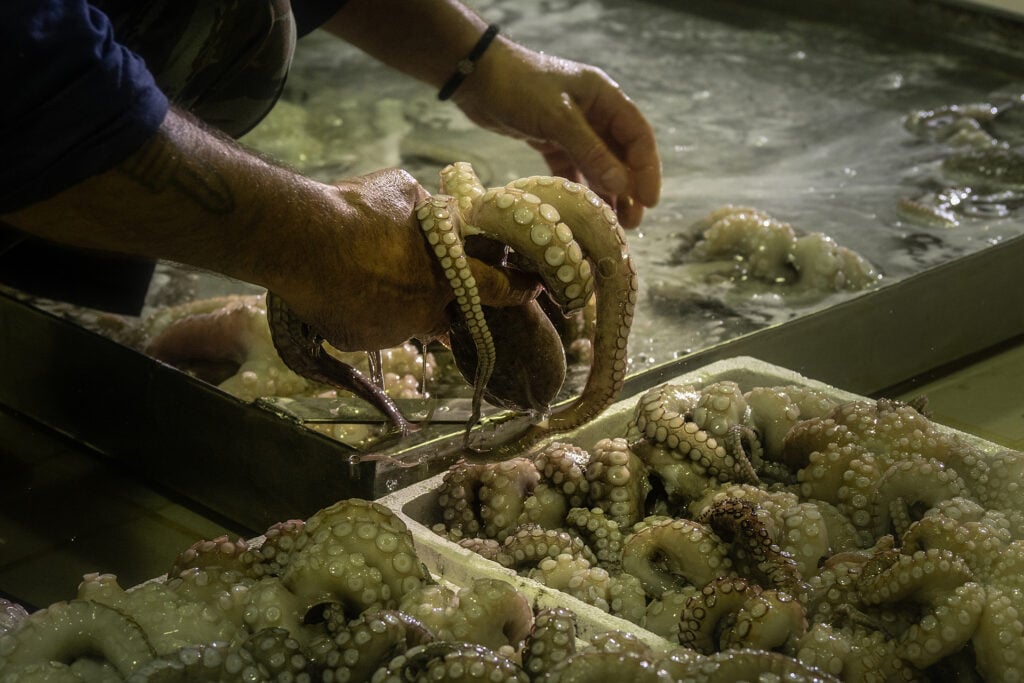
Proponents of octopus farms claim that they can fulfill growing demand without contributing to the number taken from the ocean. Similarly, Nueva Pescanova maintains that its farm will help the already overexploited wild octopus population. But experts have rubbished claims that a farm is the answer to these problems.
“To address current wild octopus population declines, we need adequate policy regulations to control the overfishing situation of these animals,” says Dr Lara. “A farm that will require of huge amount of wild fish to feed the octopuses is not the right approach to solve the issue.”
Dr Lara also points out that octopus meat is often considered a luxury product enjoyed by the wealthy, meaning that farming the animals won’t address food security issues either.
Does the octopus farm expose speciesism?
The octopus farm has not only been slammed by scientific experts, but the general public as well. A number of people, many of whom likely eat meat, have blasted the plans, and this could be seen as yet another example of speciesism among humans.
As mentioned previously, many in the vegan community believe that it is an animals’ capacity to feel, rather than other factors, that makes farming them unethical. Pigs, chickens, turkeys, cows, sheep, fish, lobsters, and other animals are all sentient and feel pain – so why is their farming not met with the same outrage?
Over the last few years, octopuses have proved a “popular” animal among humans due to their prevalence in popular culture. This is partly down to the 2020 Netflix film My Octopus Teacher, which demonstrated how intelligent, and even friendly, octopuses seemed to be. It told the story of a filmmaker who “made friends” with an octopus in the ocean in South Africa. The film was hugely popular, with many people voicing surprise at how emotionally developed the animals were. Most people are brought up with the incorrect idea that animals, particularly those in the sea, lack complex emotions seen in humans.
Octopus farming around the world
If it goes ahead, the Nueva Pescanova will likely be the first of its kind commercial octopus farm. But Spain is not the only country to be researching the viability of farming the animals.
Earlier this year, an octopus farm was started in Mexico as a research project to study the physiology of the most common regional species: Octopus Maya. In 2022, 100 percent of octopuses from the 25,416 tons of octopus caught in Mexico were from wild caught fisheries. The amount caught was down 33 percent from 2019 due to dwindling populations, meaning interest in farming the animals is growing. The farm received a $50,000 grant from UNDP (United Nations Development program).
‘Petting zoo’
A We Animals investigator recently attended an octopus “petting zoo” in Hawaii. This facility kept wild-caught octopuses in barren tanks and charged the general public to touch them. We Animals claim that the petting zoo front was a masquerade, and that it was actually doing research into the reproductive cycle of the species in order to provide information to commercial octopus farm planners overseas. The farm has since been shut down.
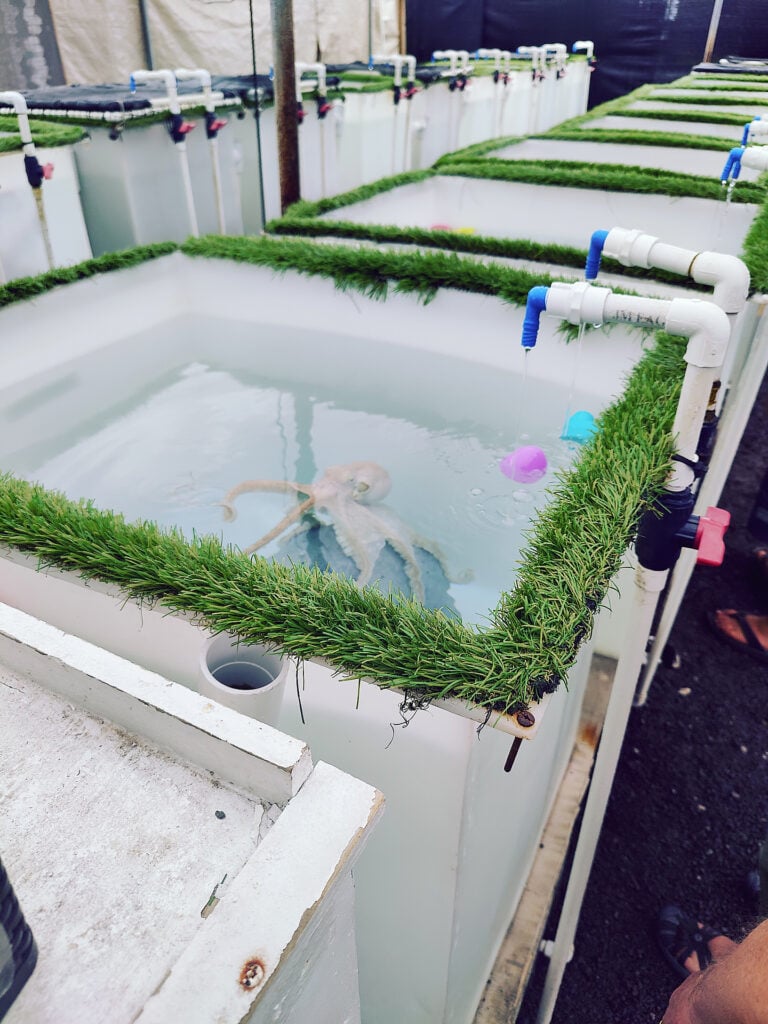
“Many of the octopuses attempted to climb out of the tanks, which were lined with Astroturf to make this uncomfortable for their arms,” investigator Laura Lee tells PBN. “The tour guide instructed us to put their arms bank into the tank each time one would start to climb out and admitted that one had gotten out on a previous day. Octopuses are complex animals who form hierarchies and problem-solve. Keeping them in confined, barren conditions is equivalent to psychological torture.”
Speaking about the proposed plans from Nueva Pescanova, she adds: “This would be the first time we farm complex octopuses on a commercial scale, which would be devastating for these animals. Octopuses can solve puzzles, escape from aquariums, and even apparently dream… This would be an unprecedented move that could open up factory farming to any species we choose.”
Countries fight back against octopus farming
Since the news about Nueva Pescanova hit the press, some countries are calling for pre-emptive moves to distance themselves from octopus farming. In March 2023, a Washington Bill sought to implement a ban on the practice in the state. Compassion In World Farming is also urging the UK government to ban the import of octopus from farms into the country.
Can we stop the octopus farm?
There are a number of petitions and campaigns you can get involved with to fight against octopus farming, details of which can be found below:
- Help Stop the World’s First Octopus Farm (PETA petition)
- Stop Spain farming Octopus for food (Change.org petition)
- Urgent: take action top stop the world’s first octopus factory farm (Species Unite)
- Stop Octopus Farm, Be an Octopus Defender (Ocean Born Foundation campaign)
- Government Petition: Ban Octopus Farming in Canada
- Make it illegal to farm octopus for the production of food (UK petition)
- Farmed octopus products must stay out of the UK
